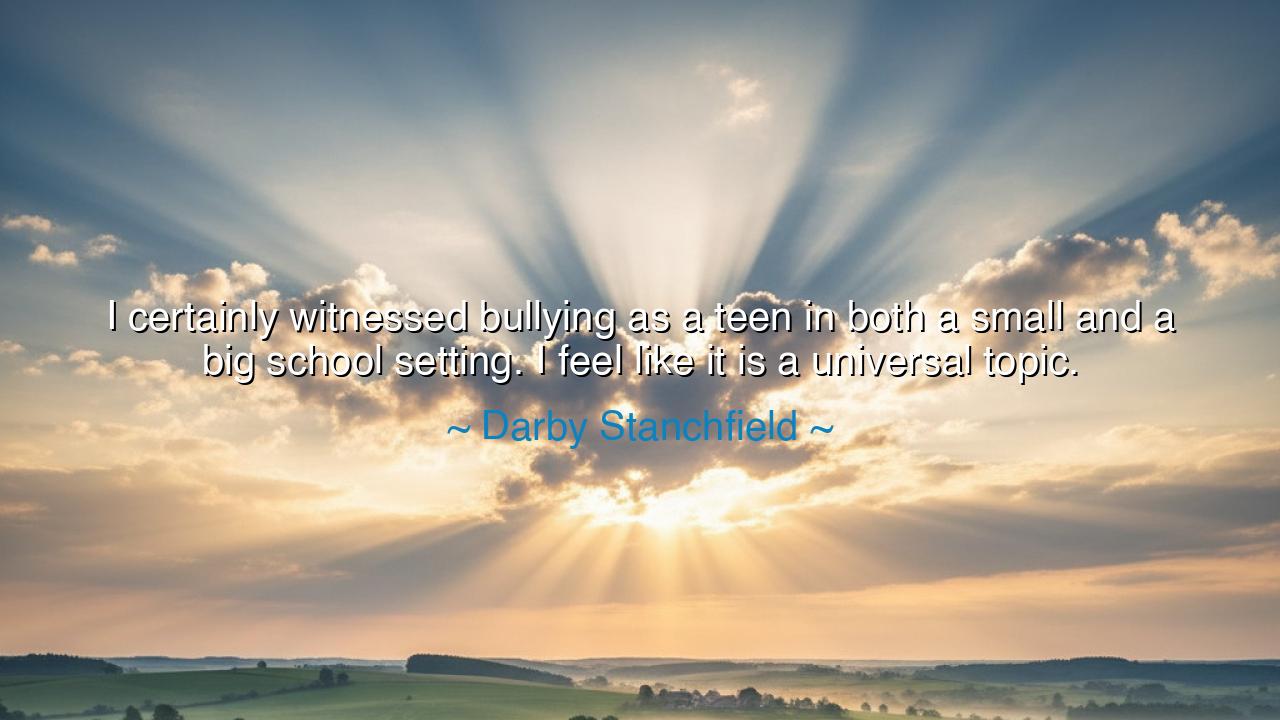
I certainly witnessed bullying as a teen in both a small and a
I certainly witnessed bullying as a teen in both a small and a big school setting. I feel like it is a universal topic.






Darby Stanchfield once reflected with quiet solemnity: "I certainly witnessed bullying as a teen in both a small and a big school setting. I feel like it is a universal topic." In these words lies the recognition of a sorrow as old as humanity—the cruelty and exclusion that one generation inflicts upon another. To witness bullying is to see the shadow side of adolescence, the raw collision of insecurity, power, and fear. Stanchfield’s observation reminds us that these experiences, though deeply personal, are also profoundly universal, crossing the boundaries of geography, culture, and circumstance.
The origin of this statement lies in Stanchfield’s own experience growing up, observing the ways in which young people exerted dominance, exclusion, and ridicule over their peers. She notes that bullying is not confined to any single environment; it can emerge in the close intimacy of a small school, where every action is magnified, or within the anonymity of a large institution, where cruelty can hide in the crowd. Her insight is grounded in the lived reality of teens navigating social hierarchies, a reality that resonates across generations and societies.
History is replete with examples of this phenomenon. In ancient Greece, the gymnasia and schools of philosophy sometimes witnessed verbal and physical bullying, as the strong sought to dominate the weak, and peer pressure shaped behavior and hierarchy. Even Plato, in his youth, recounted experiences of being mocked for his ideas and demeanor, illustrating that the trials of adolescence are as old as civilization itself. Stanchfield’s reflection connects us to this enduring human struggle, revealing that the cruelty of youth is neither new nor isolated—it is a persistent aspect of social development.
Her words also illuminate the psychological and social consequences of bullying. Adolescents who endure or witness such acts may carry scars of fear, self-doubt, or anger into adulthood. Yet awareness and acknowledgment, as Stanchfield provides, are the first steps toward empathy and action. Recognizing that bullying is universal allows society to approach it not as an isolated incident, but as a pervasive challenge requiring vigilance, guidance, and intervention.
Stanchfield’s reflection emphasizes that bullying is not merely an individual act, but a societal mirror. It exposes insecurities, biases, and fears, revealing the pressures adolescents face to conform, dominate, or defend themselves. By understanding its universality, adults can cultivate environments that promote kindness, resilience, and accountability, teaching young people to confront cruelty without perpetuating it. In doing so, the cycle of harm may be broken, and empathy restored.
The lesson for us is timeless: bear witness, act with compassion, and intervene when injustice arises. Whether one is a parent, teacher, mentor, or peer, the obligation is the same: to create spaces where cruelty is curtailed and respect is nurtured. For the witness of injustice carries power, and silence in the face of bullying allows harm to propagate. By speaking, guiding, and modeling empathy, we plant the seeds of a more just and humane society.
Therefore, children of tomorrow, heed Darby Stanchfield’s insight. Understand that the trials you face are not merely personal—they are shared across the human experience. Confront bullying with courage, protect those who are vulnerable, and cultivate compassion within yourself. Recognize the universality of cruelty, yet choose to respond with kindness, understanding, and strength. In this, you not only defend the innocent, but you forge the character and wisdom that will guide you throughout life.






AAdministratorAdministrator
Welcome, honored guests. Please leave a comment, we will respond soon